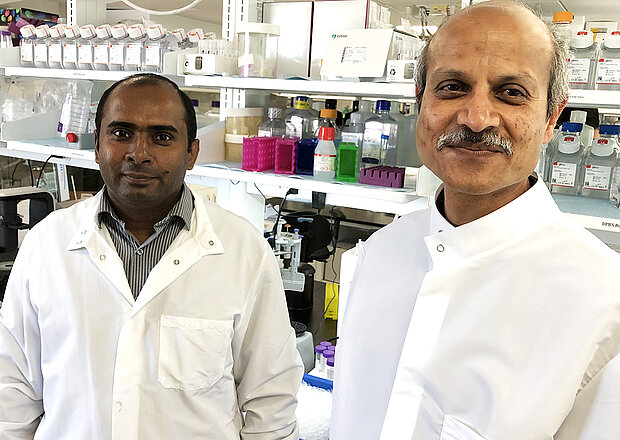
The NDSU Center for Diagnostic and Therapeutic Strategies in Pancreatic Cancer (CDTSPC) is slated to receive Phase 2 funding from the National Institutes of Health (NIH). As a Center of Biomedical Research Excellence (COBRE), the CDTSPC is focused on developing early detection and therapeutic protocols for controlling pancreatic cancer.
This award will allow the Center to build upon a previous Phase 1 award, which funded the CDTSPC during the past five years. Phase 2 will provide nearly $2 million annually for the next five years, for a total of $9.7 million.
Sanku Mallik, NDSU professor of Pharmaceutical Sciences, is the Director of the Center and Sathish Venkatachalem, NDSU associate professor of Pharmaceutical Sciences, is co-Director. By design, COBREs support junior investigators interested in pursuing research in a specific area and provide mentoring from experienced researchers.
The CDTSPC has already provided opportunities for researchers across various disciplines, including Pharmaceutical Sciences, Chemistry and Biochemistry, Coatings and Polymeric Materials, Biological Sciences, Physics, and Public Health.
In addition, the CDTSPC has two associated research Core Facilities, the Animal Studies Core and the Biostatistics Core. Both facilities are instrumental in the Center’s research and serve as vital resources for all biomedical researchers on the NDSU campus.
While Phase 1 of a COBRE award is meant to establish a center in a scientific area and offer opportunities to develop investigators with multidisciplinary research projects, Phase 2 awards are intended to improve the research infrastructure further.
Dr. Mallik looks at Phase 2 for the CDTSPC to be a time of translational research.
“We are rapidly moving from research that may not impact patients for 20 years or more to work that may be applied to patient care in the next 5-10 years,” he said.
“Earning continued funding for a prestigious NIH award like this is proof of the expertise of our NDSU researchers and it’s a hallmark of our Carnegie R1 status,” commented NDSU President David Cook. “The second phase of funding will support the ongoing investment in cutting edge facilities, help us to make healthcare discoveries that will improve the lives of people everywhere, and develop tomorrow’s scientific leaders.”
Dr. Daniel M. Tuvin, a Sanford Health surgeon specializing in complex general surgical oncology, has provided the CDTSPC with tissue samples from pancreatic cancer patients that can be grown into mice tumors for the researchers.
Dr. Mallik notes that each tumor sample is unique as each patient’s genetics. “Our partnership with Dr. Tuvin allows us to create a biobank and test a broad spectrum of treatments on actual patient-derived cancerous tissues. This fits perfectly with our next phase of projects.”
Projects planned for Phase 2 include new designs for anticancer drugs and methods to target chemotherapy for better treatments.
“Fundamentally, the conventional anticancer drugs don’t know what to attack in our bodies,” said Mallik, “so we’re going to see if we can develop nanoparticles that will act like an address label on a package so that the drugs are delivered exactly where they are needed.” Another goal of this research is to limit the amount of breakdown of the drugs that occurs in transit to the target location.
In addition to that project, CDTSPC researchers will analyze cancerous and non-cancerous tissue samples from a biobank provided in partnership with the Mayo Clinic. Mallik says the researchers will be searching for genetic signatures that may be used as markers for the development of pancreatic cancer.
In addition, the researchers will be using a public health-type perspective to determine if there are any correlations with lifestyle. “We want to determine if we can map out lifestyle changes that could impact a person’s chance of contracting or surviving pancreatic cancer.”
In the future, Mallik and Venkatachalem plan to continue growing the Center, providing mentoring to researchers and graduate students, and hope to apply for the final phase of funding.
“At the point of Phase 3, we’d become a self-sustaining Center with research Cores,” he said. “This will help NDSU continue to be an important hub in the development of tools and processes to help minimize the impact of cancer on people,” said Mallik.
NDSU Vice President of Research and Creative Activity Colleen Fitzgerald said, “This is precisely the kind of cross-college research collaboration that we need to keep NDSU on point with the kinds of large multidisciplinary initiatives that deal with critical, big real-world challenges, like the devastating impact of pancreatic cancer.”
“This continued funding recognizes high caliber research collaborations and the significant role of pharmaceutical sciences faculty working with others to help develop solutions to treat diseases such as cancer,” said Charles Peterson, dean of the College of Health Professions and School of Pharmacy.
The CDTSPC is located within the Department of Pharmaceutical Sciences at NDSU which offers MS and PhD degree programs, emphasizing both research and teaching excellence. The department's research portfolio includes R01 grants from the National Institutes of Health, with research focused on the role of pharmaceutical sciences in disease prevention, disease treatment, and additional research to promote health.
The Center for Diagnostic and Therapeutic Strategies in Pancreatic Cancer is supported through funding awarded by the National Institute of General Medical Sciences of the National Institutes of Health under Award Number P20GM109024. The content is solely the responsibility of the authors and does not necessarily represent the official views of the National Institutes of Health.


